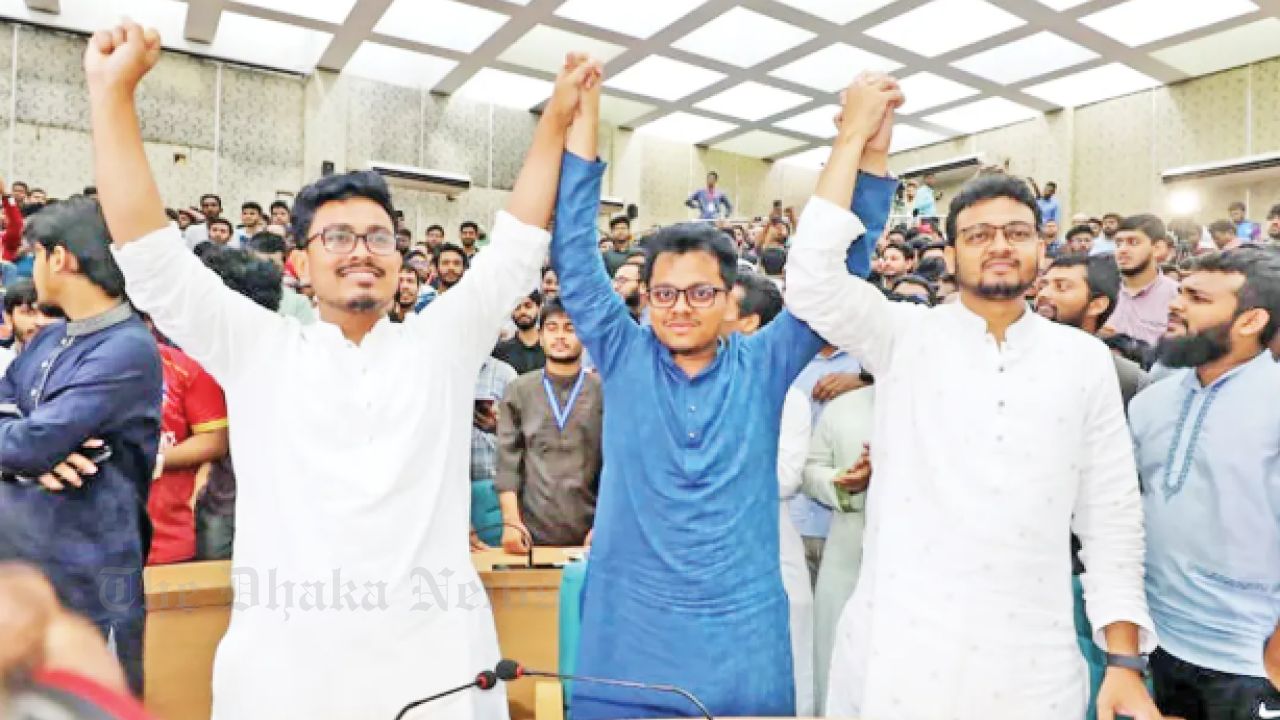.png)
Release Date : ১১ সেপ্টেম্বর ২০২৫
The reason for Shibir's landslide victory and Chhatra Dal's disaster

Rashedul Islam ||
The Dhaka University Central Student Union (DUCSU) elections have put an end to all speculation. In this election, candidates supported by Islami Chhatra Shibir have made history and won most of the posts. On the other hand, the BNP-backed Jatiyatabadi Chhatra Dal has suffered a major setback. Not only was it defeated, but their candidates could not even reach the second place in many posts.Many see long-standing organizational weakness, lack of leadership and failure to understand the needs of students as the main reasons for the downfall of Chhatra Dal. According to them, the lack of a permanent presence on campus, the apolitical behavior of some BNP leaders across the country, weak propaganda and divided leadership have made students distrustful of the organization. On the other hand, Islami Chhatra Shibir tried to strengthen its position immediately after the July uprising. They quickly came into the discussion through various programs in the interest of students, standing by the injured and student-friendly activities. The organization has also shown innovation in the nomination of candidates. Going beyond their known leadership, they have surprised by including female students, representatives of those injured in the July movement and minority students in the panel. This multi-dimensional strategy has left its mark on the minds of the students. They have maintained an organized and active presence in the campaign. Their message has spread to every hall and department. This has been reflected in the election results.The internal conflict of Chhatra Dal is also a much-discussed issue. Although in the end, everyone rose above differences and groupings and campaigned openly. However, that campaign was completely simple; there was no novelty. It could not touch the hearts of the students either. Chhatra Dal candidates also failed to respond to the digital campaign. VP candidate Abidul Islam Khan, GS candidate Tanvir Bari Hamim and AGS candidate Tanvir Al Hadi Mayed were able to highlight themselves to some extent, but the rest of the candidates were in the background. Apart from this, there was no integrated plan of the entire panel; everyone was limited to separate campaigns.The Chhatra Dal candidates in this election were familiar faces. Abidul was a talked-about name in the July-August movement, and Hamim was involved in various service activities on campus for the past year in addition to being active in the July movement. Mayed also supported various issues of ordinary students, including the movement. However, the problem is that they did not know until August 20 that they were DUCSU candidates. Therefore, even though the candidates were announced at the last minute, they could not present themselves properly.On the other hand, immediately after the mass uprising, the wind of anti-student politics started blowing on the campus. The memories of the past 'guestroom-public room' culture were heavy on the minds of the students. It was in this situation that the Hall Committee of the Chhatra Dal was announced, which was not well received by the ordinary students. On the contrary, many protested it. Apart from this, the negative activities of some BNP leaders and activists in different parts of the country also affected the DUCSU vote. Many students believe that even the 'insensitive' comments of some central leaders helped create an anti-Chhatra Dal attitude among the students.Students say that Shibir was much better organized on campus compared to other organizations. Since the committee was formed with regular students, almost every leader had direct contact. From helping during times of trouble on campus to their visible role in cultural and academic events, their role played a major role in gaining the trust of the students.Shibir has been planning around DUCSU for about a year now. They reach out to students through various programs including educational support programs, medical assistance, blood donation, campus cleanliness, and standing by those injured in the mass uprising. These service programs make not only supporters but also many neutral students sympathetic to them.Shibir leaders claim that they have about 4,000 'reserve voters' in the university. In addition, there are many students who have benefited from their programs or were sympathetic. By connecting with these voters, Shibir won the elections by a large margin.Shibir also shows innovation in candidate nominations. Along with the top leadership, they include female students, representatives injured in the July movement, and minority students in the panel. This inclusive strategy sends a positive message to students that DUCSU does not belong to just one organization, but to everyone.Abu Sadiq Kayem, elected as VP, SM Farhad as GS and Muhammad Mohiuddin Khan as AGS—all three are well-known faces at the top level of Chhatra Shibir. Kayem is the former president of Dhaka University Shibir and is currently the central publication secretary. Farhad is the current president and Mohiuddin is serving as the general secretary. Kayem's active role in the mass uprising was publicized in the domestic and international media, which made him acceptable to the general students as well. Similarly, Farhad and Mohiuddin played a major role in spreading the July Movement.Shibir also brought innovation in its campaign. The campaign was conducted through coordinated teamwork in each hall and department. The election message and program were clearly conveyed to the students. They were also ahead in digital campaigning. Some election songs received a huge response among the students. Daily campaign activities were disseminated on social media in the form of videos. In addition, digital presentations were also published on past service programs and future manifestos. Overall, this strategy had a profound impact on the minds of ordinary students and paved the way for the Shibir's huge victory in the elections.
Copyright © ২০২৫ । All rights reserved.
